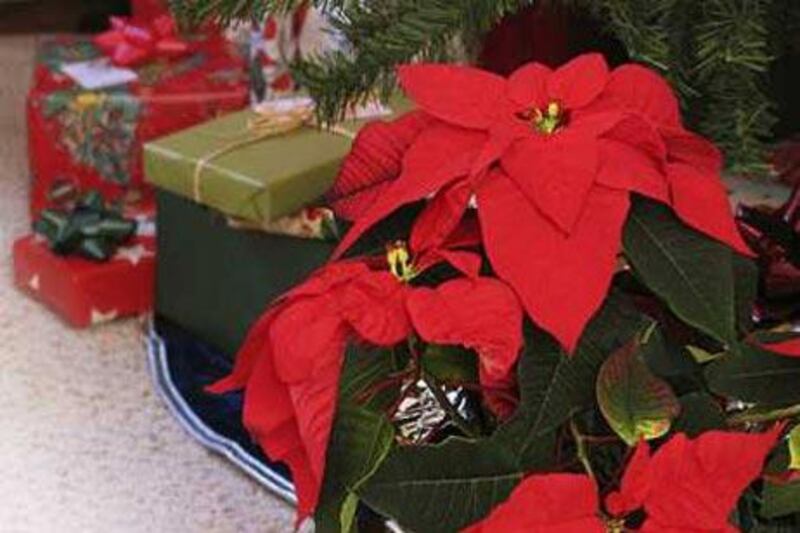What did we get for Christmas? Plants. Now, these beribboned babes are sitting in their pots, staring at us with steely expectancy, because they have been cosseted and waited on since pollen kissed stigma. They have been overfed, overheated, tricked by artificial round-the-clock daylight, coaxed, cajoled and bullied into coming into full bloom in time for the festive season, against all their natural instincts to flower in spring and summer. They are pretty and spoilt. Finding themselves in the ramshackle disorder of a lazy gardener's surroundings will have come as a gross culture shock.
The trouble is, they all have different needs. But don't panic, because more plants are killed by kindness than by neglect. A very good example of this is the most popular of all these festive gifts. Christmas Poinsettias (Euphorbia pulcherrima). With their scarlet bracts, these are the season's extroverts - but too much attention will certainly bump them off. During winter, water just enough to keep the pot from drying out completely, no more. Although the climate here is rather hot for planting it out in spring, you might risk a sheltered position in filtered sunlight. But it's probably safer just to transfer yours to a larger pot that you can move in or outdoors, according to the temperature. In summer, water it regularly, give a weak fortnightly feed and, eventually, it should grow into a handsome 1-2m shrub.
Azaleas. Those given as gifts are usually the beautiful, small Japanese varieties with flowers like delicately coloured butterflies. In modern terminology, these plants suffer from "idiopathic environmental intolerances". In other words, they're allergic to almost everything: lime, chalk, cold nights, full sun, wind, extreme heat - and they completely lose their appetites in summer. They are totally unsuitable for UAE gardens. In winter and spring, feed with specialised, organic plant food for acid lovers, then transplant to the next size up pots if necessary. Keep them watered in shady conditions or indoors during summer and you could be lucky. They might live until next year.
Bird of Paradise (Strelitzia). This is definitely the right gift for anyone with a balcony, patio or garden here. Under northern skies, these plants look as over the top as Bet Lynch behind the bar in the Rover's Return, but they come into their own in the brilliant light of Arabia - like flamboyant belly dancers with bells on. They flower naturally in winter, when they should be kept almost dry. In spring, plant yours in a shady spot, or into a larger jardinière, water normally - then hide it in a corner where it can sulk all summer. Over the years it will fill bigger and bigger planters until it becomes a traffic-stopping spectacle.
Winter Cherry (Solanum capsicastrum). With fruits like cherry tomatoes, this children's favourite is sold everywhere around yuletide and is a very useful little plant to receive here. It needs to be kept moist and can be planted out in spring to develop into a compact shrub of around 60cm. Pinch out the growing tips to prevent leggy growth and it's worth feeding and syringing when the tiny flowers open to encourage the fruits for next Christmas. Solanum rantonnetii, its cousin from Paraguay, may also have turned up looking equally demure, but don't be fooled. This plant is indestructible and, if you actually succeed in murdering it, perhaps you should give up gardening and take up collecting thimbles. Planted out, it needs hard pruning in January or February to keep it in order. However, if you have the space, it rapidly makes a splendid 4m high feature covered in blue, starry flowers all year round and needing hardly any attention.
Palms. I hope every lazy gardener was lucky enough to be given a little palm. As slim, elegant and spiky as a supermodel, no plant symbolises the exotic life of the Emirates more, or can turn a junkyard into a magical space faster - in return for only shade, warmth and water. Orchids. Being given an orchid is both flattering and frightening, like having Mariah Carey arrive on your doorstep without having been given a list of her requirements before she'll hit the opening note of Without You. (For those who are interested, these are: Cristal champagne, Camus white wine, tea service for eight, air purifiers, air humidifiers, gold pretzels, seltzer water, sugarless gum, Ricola throat lozenges, grilled fish or shrimp, assorted freshly baked breads, stuffed pork chops, roasted turkey, wild rice, black beans, Italian, Mexican, Cajun, Thai, Indian and Greek cuisine.)
However, our temperatures here suit the orchid and, in general, her other demands are no more than those of any diva. Shade, osmunda fibre soil, humidity created by misting two or three times a day and submerging in a bucket of water for a few minutes twice a week, a well-drained pot, as she hates to be left sitting in water - and do not repot until she has outgrown the container. Her crown should always be level with the pot rim.
In fact, caring for the new arrivals in your home is simple. Don't blast them with icy air conditioning. Don't stand them in blazing sun. Don't starve them for more than two or three months. Don't let them die of thirst. Don't drown them. Remember that all plants want to live.






